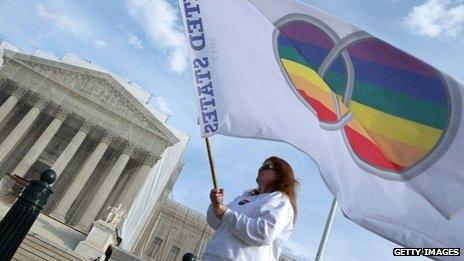US Supreme Court to rule on gay marriage cases
- Published

The hearings at the Supreme Court will be the first time the justices have considered the issue of gay marriage
The US Supreme Court has agreed for the first time to hear challenges to laws banning gay marriage in the US.
The court will hear, external challenges to the Defense of Marriage Act (Doma), which defines marriage as between a man and a woman.
It will also consider Proposition 8, a constitutional amendment in California that overturned a state law allowing gay weddings.
The court is likely to hear the cases in March next year.
A ruling could be issued in June.
Both Proposition 8 and Doma have been previously struck down by lower courts.
The Supreme Court has the option of reversing the lower judgements - thus reinstating both laws - or upholding them, which could afford gay weddings legal status under the US Constitution.
However, the justices have also reserved the right to decide that they do not have jurisdiction to hear the cases.
'Unfair discrimination'
Backers of the California case argue that voters in the state breached the US Constitution by passing Proposition 8.
They will argue that a state Supreme Court ruling allowing gay marriage to go ahead should stand. No gay weddings are currently allowed in California, pending the outcome of the Proposition 8 case.
Doma, a federal law signed by former President Bill Clinton, has been overturned by four federal courts and two courts of appeal. They said Doma unfairly discriminated against same-sex couples.
It was most recently rejected by the 2nd Circuit Court of Appeals in New York, which ruled 2 to 1 on October that it violated the equal protection clause, external of the Constitution.
President Barack Obama, who backed gay marriage in May, also took the unusual step of announcing that his administration would not back Doma in court.
Although the federal government no longer defends Doma, it is the New York case, first brought by a widow called Edith Windsor, that the Supreme Court will hear.
She was forced to pay more than $350,000 (£220,000) in taxes after the death of her wife because Section 3 of Doma defines "marriage" and "spouse" as only relating to unions of men and women.
The law is supported by Republicans in Congress, and lawyers acting for the House of Representatives leadership are defending the law instead of the US government.
The court was also asked to consider the merits of a challenge to part of a 2009 Arizona law granting marital benefits only to legally married state employees. Gay marriage is not legal in Arizona.
But the nine justices chose not to hear that case, instead opting for the two cases analysts say offer a chance of a broad ruling.
- Published6 December 2012
- Published18 October 2012